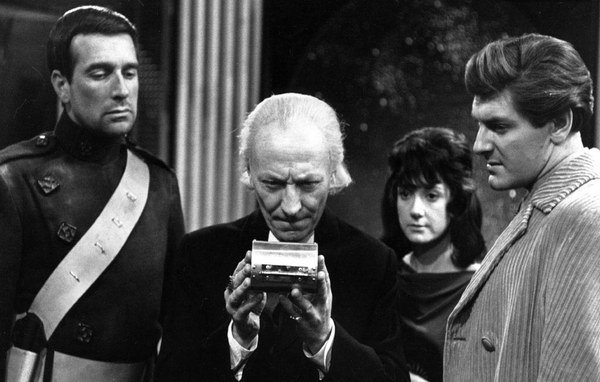One of Doctor Who Magazine’s great strengths has always been it interviews – over its 500 issues the magazine has spoken to just about everyone it possibly could have who has been involved in the making of the show. And it has to be said that the most memorable conversations written up in the pages of our favourite magazine tend to be those where the interviewee gives a, shall we say, full and frank description of their experience making Doctor Who.
I’m thinking of production manager (and partner of John Nathan-Turner) Gary Downie giving it both barrels to just about anyone he felt had ever crossed him in an interview that made for uncomfortably gripping reading not too long before his death in 2006. Others which spring to mind, though far less vitriolic than that example, include Colin Baker arguably doing himself few favours by protesting at the kind of polls which tend to place his debut story, and indeed his Doctor, at the bottom of fans’ favourites lists. Last year good old Peter Purves certainly wasn’t in the mood for sugar-coating his comments when he described someone from his time on the show as ‘totally incompetent. He wasn’t a very nice man – I had no rapport with him, I didn’t respect him, I didn’t think he knew what he was doing. He was stupid.’

Phew! Tell it like it is, won’t you Peter? The person Purves was directing his ire at was producer John Wiles, who succeeded Verity Lambert in 1965 and oversaw just four stories: The Myth Makers, The Daleks’ Masterplan, The Massacre and The Ark. Wiles was a cerebral character, more at home with writing (his list of televison credits is considerable) and directing for the stage than producing a show in a genre he had little time for. Wiles spoke to DWM back in 1983 for that year’s Winter Special:
“I was never happy with the role of a producer. A producer is really a desk person, deriving pleasure and satisfaction from battles in the office. This was very frustrating for me as I am much more a writer and a director. I want to get down onto the floor and pull it together; to make it work with the actors and the crew.”
Wiles himself felt he was a poor fit for the job, though his task was surely made vastly harder by his difficult relationship with the show’s star. It’s fair to say that Wiles and William Hartnell didn’t exactly hit it off…
“He wasn’t as old as he thought he was. When he was with me he treated himself almost as a seventy-five year old. It may well have been that he was physically not in the best of health and so he could not learn his lines. Consequently, studio days could be absolute purgatory for everybody. If Bill was in an unhappy state then it put everyone into a terrible state.”
Oh dear… It’s worth stressing how unusual it was to read this kind of insider detail back in 1983, and indeed it may be that this edition of DWM was one of the first examples of someone who had worked on the show being quite to honest in describing their time in negative terms.

Wiles’s recollection of the programme’s dressers walking out on strike in protest at Hartnell’s rudeness to one of their number encapsulates the image of an unhappy production and a spell in his career that Wiles, who walked away from his job (‘I’m one of the few producers ever to resign from the BBC’), preferred to forget. Interestingly, the antipathy Peter Purves felt for his producer wasn’t reciprocated, with Wiles saying:
“He was very supportive and helped as much as he could. I imagine it must have been very nerve-wracking for him in that he never knew, from one day to the next, what was coming from Bill.”
There are snippets of detail that give an indication of the direction Wiles would have taken Doctor Who if he had had the chance – increasingly adult-oriented, a more serious tone with stories that veered towards the kind of science-fiction Star Trek pursued. He had little time for the ‘fantasy romp’ of the mammoth Dalek serial he was left with by the previous production team, poetically describing it as ‘an enormous rock in the middle of a sea, and one on which any boat we were going to run would be submerged’.
John Wiles died in 1999 and would probably be uncomfortable at the thought that his best-remembered credit was for a period which had, in his words, left him ‘heading very rapidly for a nervous breakdown’. Being in charge of Doctor Who plainly isn’t a job that’s going to suit everyone, and you can sense the sigh of despair in Wiles’s closing thought:
“I do remember suggesting to Bill that we take the TARDIS to a planet where there is no gravity and no oxygen – where he would have had to wear a spacesuit. You never heard such an uproar in all your life…”